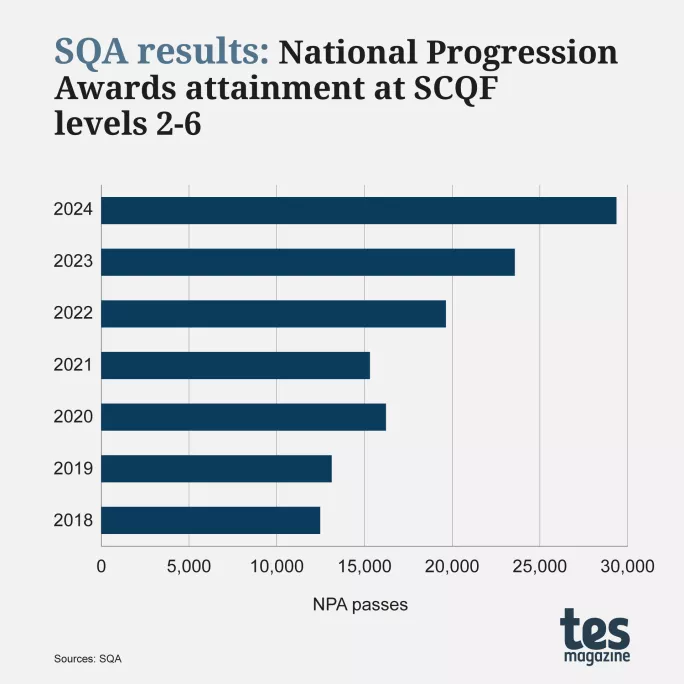Why the drive to reduce exams in Scotland is foundering

New (school) years are a time for bold ambition and grand statements of intent.
Unless, it seems, you’re overseeing the future of Scottish education.
Through a drip feed of hints over several months, it’s become increasingly clear that education secretary Jenny Gilruth is not planning the sort of sweeping reforms that many hoped for.
Encouraged by last year’s Hayward review of qualifications and assessment (the official Scottish government response to this has still to appear as the new school year starts, 14 months later), many people had foreseen a future where the senior phase didn’t pivot on exams and the education system rewarded a richer palette of student achievement.
Some change in Scottish education
And let’s be clear that, to some extent, this change is already happening.
You see it in the fast-rising number of exam-free courses such as National Progression Awards (NPAs) offered in schools (see the graph below), you see it in the proliferating number of pathways through secondaries, you see it in the determination of teachers and school leaders to make sure that school works for every pupil in a way that wasn’t true in years gone by.

And yet, the rigidly linear, exam-laden path through S4-6 still prevails, as it has done for as long as anyone working in Scottish schools can remember. We should never forget just how unusual it is in international terms to have three years in a row of high-stakes exams, as Gilruth and her predecessors have been reminded countless times.
In comments reported in The Times at the weekend, however, the education secretary suggested that now, when money is tight, is not a good time to entertain big changes such as wholesale removal of exams at National 5. (It should be stated that opinion seems divided on whether to significantly reduce the number of exams, but there is certainly widespread support among teachers and school leaders for the principle of parity between “academic and vocational qualifications”.)
- Also this week: Data shows decades-long retreat of languages from Scottish schools
- SQA exam results: The attainment gap widens
- School leaders: “We need to look beyond the data”
There is more to it than money, though. Andy Harvey, national officer at the EIS teaching union, was on to something in the same article when he suggested that our weddedness to current approaches is also a “cultural” thing. Scotland’s exams system has taken root over many years - Highers stem back to the 19th century - and sometimes, even if you know something is not ideal, it’s easier to stick with what you know.
The cultural norms of Scottish education put the brakes on reform. Awareness of qualifications such as NPAs outside of the education system remains relatively low, for example, and their cause is not helped when, however much you insist that all qualifications at SCQF level 6 are equal, universities clearly still value Highers more.
The website for admissions body Ucas states that, for now at least, NPAs can be used to complement Highers - but they are “not the standard entry requirement” and “candidates would generally not be expected to apply to undergraduate degree study directly with a NPA”.
‘Most-examined students in the world’
“I think Scottish students are the most over-examined in the world,” said Professor Gordon Stobart after publishing his 2021 paper for the Organisation for Economic Cooperation and Development on upper-secondary assessment in Scotland.
Many in Scottish education are not happy about this situation, and yet cultural and structural barriers are so solid they appear to have largely resisted the huge impetus for change catalysed by Covid. Certainly, when I saw the exams system from a parent’s point of view for the first time this year, it didn’t feel very different to what I went through myself 32 years previously.
Despite the hard stop of exams, more imaginative and wide-ranging approaches to the senior phase are playing out thanks to ingenious teachers and school leaders, who find ways to navigate the limitations of the system around them.
Some change at a national level will come on the back of the Hayward report when the government publishes its response - presumably in September - but it seems likely that rhetoric of bolder reform will be tamped down by an education system that, when it comes to the latter part of secondary school, is remarkably resistant to change.
We’ve seen this before with myriad disappointments around the impact of Curriculum for Excellence at secondary level: initial claims of bold new approaches that are diluted or warped when they come into contact with long-established realities.
If culture eats strategy for breakfast, then Scottish education culture likes to wolf down reform for lunch - and finish dinner with an acrid belch of what might have been.
Henry Hepburn is Scotland editor at Tes. He tweets @Henry_Hepburn
For the latest Scottish education news, analysis and features delivered directly to your inbox, sign up to Tes magazine’s The Week in Scotland newsletter
You need a Tes subscription to read this article
Subscribe now to read this article and get other subscriber-only content:
- Unlimited access to all Tes magazine content
- Exclusive subscriber-only stories
- Award-winning email newsletters
Already a subscriber? Log in
You need a subscription to read this article
Subscribe now to read this article and get other subscriber-only content, including:
- Unlimited access to all Tes magazine content
- Exclusive subscriber-only stories
- Award-winning email newsletters
topics in this article



